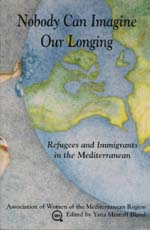 | Nobody Can Imagine Our Longing. Refugees and Migrants in the Mediterranean. Introduction Yana Mintoff Bland |
During the cold war, we were told that antagonistic political and economic systems were responsible for perpetuating the arms race, encouraging dictatorships, and increasing poverty - in the Mediterranean and the world as a whole. But post cold war years have dispersed this smoke screen. It is the same predatory element, characterized by militarism, expansionism, exploitation and greed, that now reveals its violent patriarchal, impoverishing face and its grimace is reflected in the perpetual frown of the woman refugee.
The militarists and monopoly capitalists go on blaming the victims! They call us Greek Cypriots and Turkish Cypriots; Bosnian Serbs, Bosnians, and Bosnian Croats; they call us Jordanian Palestinians and Lebanese Palestinians, and they exploit us. They call us subversives or treat us as pliable pawns; they separate us from the sea that unites us, and they destroy that sea; they sell arms, and drugs, and prostitute our women. They relentlessly loot our resources and afterwards ignore the poverty their greed perpetuates.
We ask you NOT to ignore the reality of present day capitalism. We ask you to listen to the stories of the refugees and immigrants whose lives are being shattered, and whose fragmented societies make up the mosaic of the Mediterranean today.
The Association of Women of the Mediterranean Region (AWMR) met in Limassol, Cyprus, June 26-30th, 1996, to discuss the situation of "Refugees and Immigrants in the Mediterranean". It was our fifth annual conference, and the first to be held in Cyprus. The Cyprus Organizing
Committee did a fantastic job, and the conference was attended by nearly a hundred women, including refugees, migrants, and women who work in refugee programs.
Our sisters from Gaza were unable to attend this year due to restrictions on their freedom of movement. Women came from Israel, Palestine, Lebanon, Albania, Kosova, Serbia, Croatia, Bosnia, Italy, Malta, Tunisia, USA, Germany, Bulgaria, and of course Cyprus, to give papers and develop united action. This book includes many of the papers presented and the resolutions passed.
The plight of 170,000 refugees of the 1974 Turkish invasion of Cyprus and the continued division of this beautiful island to the present day was particularly vivid. We visited the only divided capital city in the world - Nicosia. We saw the green line so ridiculously dividing the island - the scene of repeated, tragic, killings. In Limassol, we were impressed by the housing provided by the local government to refugees. We ask you to join us in advocating a just and peaceful solution to end the partition of Cyprus.
The deteriorating living conditions of hundreds of thousands of Palestinian refugees are detailed in moving accounts and learned papers. Fatahiyah A'waysie relates her personal experiences as a refugee in very poignant words. Fadwa Labadi's study of housing conditions and Ayesha Rifai's look at health care include up-to-date information from a woman's perspective that is difficult to find elsewhere.
The article sent by Shadia Matar from Gaza, where 82% of the population are refugees, raises the importance of refugee participation in the "peace process" and the need to make refugee-rights a priority. This view is reinforced by Roni Ben Efrat in Israel; while Aida Touma Soliman paints a shocking picture of the conditions of many Palestinian citizens of Israel. Rita Hamdan contributes exceptional insight on the lack of rights and freedom of movement for Palestinians in Lebanon.
The tragedy of the 900,000 refugees in Bosnia (among the millions of displaced people in former Yugoslavia) is clearly portrayed by Nurka Babovic and Marjana Senjak in their shocking account of life in collective refugee centers in Zenica, just north of Sarajevo. They detail the terrifying violence suffered by children and show that every age group, including people over 76 years of age, have suffered violence in the war in Bosnia and Herzegovina.
Many of the accounts in this section explore the conditions of thousands of women refugees in Serbia; and Dr. Maja Kandido-Jaksic details the particular hardships faced by high school student refugees. Perhaps one of the most startling conclusions from this section is that - far from bringing prosperity peace has led to increased poverty and deeper despair.
Aicha Boubaci of Algeria writes about her experiences as a refugee in Germany. Pauline Miceli talks about the need for refugees in Malta to have the right to work.
Saida Agrebi shows what Southern Mediterranean governments could do for emigrant women and their families, while Dr. Katia Bellillo illustrates the complementary advances Northern Mediterranean local governments can take.
In Italy, migrant and supportive women are organizing, not only on a national and regional level, but also addressing the international community and amending the Plan of Action produced by the 4th World Conference on Women at Beijing. Charito Basa (a Filipino migrant), and Ada Donno give this positive perspective, showing that unity is strength.
Margarita Papandreou's contribution is a deep and inspiring discussion of the importance of women's leadership to further democracy and prevent wars, and Dr. Sylvia Zrinzo's description of the psychological traumas of the refugee is a clarion call for responsible governments. Finally, you will find the syntheses: the resolutions written late at night by groups of highly motivated, wonder women, which we hope you will discuss and adopt.
For we need not only to overcome national and ethnic barriers, to love our so-called "enemies to give women a voice, and end their isolation and vulnerability; we need to develop our unity in every dimension like branches of a tree that is daily growing taller and stronger. We need you to help water that tree - to join us in our educational work, to help write, translate, and transmit our news releases and newsletters, give talks, participate in conferences, help establish the women's economic cooperative which has already begun to market goods made by refugee women, and advance economic and political co-operation for justice, equality and peace.